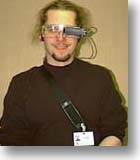Interfaces for Augmenting Face-to-Face Conversation
Using Wearable Computers
 Thad.
Starner, Georgia Tech
Thad.
Starner, Georgia Tech
thad![]() cc.gatech.edu
cc.gatech.edu
Seminar on People, Computers, and Design
Stanford University April 1, 2005
Speech is ubiquitous in the office environment; workers spend 35-80% of their time in spoken conversation. Yet few computer interfaces are designed to assist the user while engaged in the serendiptious face-to-face conversation that often occurs in the office.
Our studies on mobile calendaring devices, such as PDAs and paper-based day planners, show that they are often not used during face-to-face conversation. Instead, users delay entering information until well after the conversation has been completed. However, anecdotal and formal observation of expert wearable computer users reveals that they do use their interfaces during conversation and take copious notes. Is this distinction due to traits of the early adopters themselves or is there a difference in which types of use these interfaces enable? Can we use the experience of these early adopters to design interfaces specifically for augmenting face-to-face conversation?
This talk will explore the current use of mobile devices and will describe
studies on two promising technologies: dual-purpose speech and the Twiddler
one-handed keyboard. In addition, I will discuss the ongoing development of
a one-way sign-to-English phrase translator which may someday augment conversation
between hearing and deaf individuals.
Thad. Starner is an Assistant Professor in Georgia Tech's College of Computing. He is a wearable computing pioneer, having worn a wearable as an everyday personal assistant since 1993. Starner holds four degrees from MIT, including his PhD from the MIT Media Laboratory in 1999. Thad has authored over 90 scientific publications on mobile computing, intelligent agents, computer vision, and augmented reality, and Thad's work focuses on computational assistants for everyday-use wearable computers to segue to practical artificial intelligences.
View this talk on line at CS547 on Stanford OnLine
Titles and abstracts for previous years are available by year and by speaker.